⭐⭐Weekly contest: What you loved most about your Country⭐⭐ // Nigerian Culture- What I love most about my Country⭐⭐.by @adebayosefiu
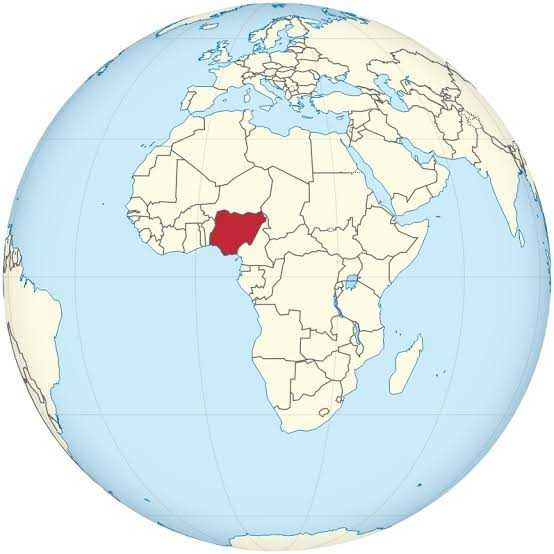
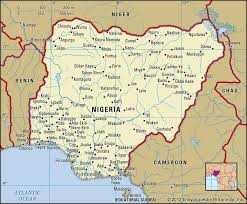
( )
)
Sources
Diversity ethnicities and Culture of Nigerians.
Nigeria, officially named the Federal Republic of Nigeria, is a diverse West African country. Nicknamed the "Giant of Africa," Nigeria is home to hundreds of different ethnicities, languages and butterfly species.
Even though there are many interesting, educational and Fun-fact about my Country Nigeria, there is one I personally found most amazing, it's the Nigerian culture. How can a country with so many different ethics group with different history and culture stay together have being the question around the world since 1914.
The culture of Nigeria is shaped by Nigeria's multiple ethnic groups. The country has 527 languages, seven of them are extinct. Nigeria also has over 1150 dialects and ethnic groups. The three largest ethnic groups are the Hausas predominantly in the north, the Yorubas predominate in the southwest, and the Igbos in the southeast. There many other ethnic groups with sizeable population across the different parts of the country. The Kanuri people are located in the northeast part of Nigeria, the Tiv people of north central and the Efik - Ibibio. The Edo people are most frequent in the region between Yorubaland and Igboland. Many of the Edo tend to be Christian. This group is followed by the Ibibio/Annang/Efik people of the coastal south southern Nigeria and the Ijaw of the Niger Delta.
Nigeria's other ethnic groups, sometimes called 'minorities', are found throughout the country but especially in the north and the middle belt. The traditionally nomadic Fulani can be found all over West and Central Africa. The Fulani and the Hausa are predominantly Muslim while the Igbo are predominantly Christian and so are the Efik, Ibibio, and Annang people. The Yoruba are equally likely to be either Christian or Muslim. Indigenous religious practices remain important to all of Nigeria's ethnic groups, and frequently these beliefs are blended with Christian beliefs, a practice known as syncretism.
EFIK-IBIBIO CULTURE
![1617421181791.jpg]
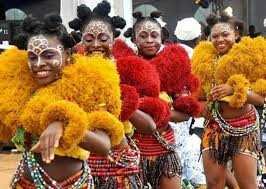
The Efik-Ibibio culture of coastal southeastern Nigeria has made a significant contribution to the culture of Nigeria, especially the culture of the southern region. A brief summary is as follows:
Efik-Ibibio language: This language is spoken in Akwa Ibom State and Cross River State. It has various dialects such as the Annang dialect, Oron dialect, and many others. The Efik-Ibibio language has a significant influence on the languages and names of the people of southern Nigeria.
Protectors: The Efik-Ibibio culture was protected by a secret society, the Ekpe, that was indigenous to southeastern Nigeria. The "Ekpe", meaning 'Leopard', became a popular symbol in the Efik-Ibibio culture which later became popular in other Nigerian ethnic cultures.
Writing: Nsibidi is the popular ancient indigenous writing of the Efik people was invented by the Ekpe of the Efik-Ibibio people.
Food: Located in the coastal southeastern Nigeria by the Atlantic Ocean, the Efik-Ibibio people are blessed with various edible vegetables. Their food is popular throughout the entire Nigeria including the popular Afañg soup, Edikang Ikong soup, pepper soup, Ukwoho, Atama, Eritañ, jollof-rice, etc., etc.
BINI CULTURE
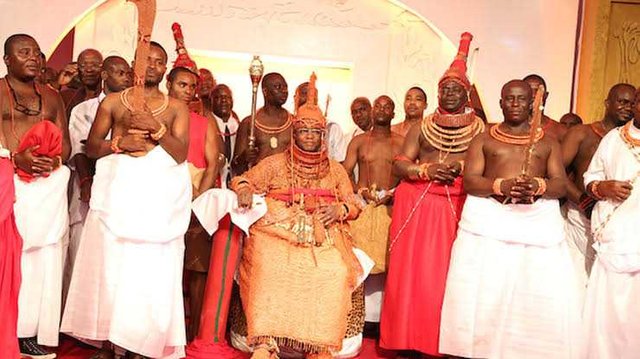
Source
The Binis are located in the South South region of the modern day Nigeria. They sometimes are called the Edos and are surrounded by other ethnic culture like the Urhobos, Itsekiri, Ishan, Yorubas amongst others.
YORUBA CULTURE
The Yorubas are located in the western region of Nigeria and their leadership is monarchial in nature. They have kings who are allowed to take as many wives as they want and chiefs and titled individuals. They also practice traditional worship, paying homage to gods like Sango; the god of thunder, Oya, Ogun; the god of iron...etc. The Yoruba people are very friendly and welcoming to people of other tribes and nationalities.
IGBO CULTURE
The eastern part of Nigeria is the home of the Igbos, who are mostly Christians. Their traditional religion is known as Omenani. Socially they are led by monarchs known as Eze Igwes. These figures in turn are expected to confer subordinate titles upon men and woman that are highly accomplished. This is known as the Nze na Ozo title system. People of title are usually well-spoken, highly respected and well recognized in their communities.
HAUSA-FULANI CULTURE
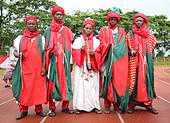
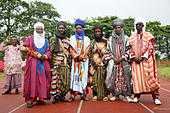
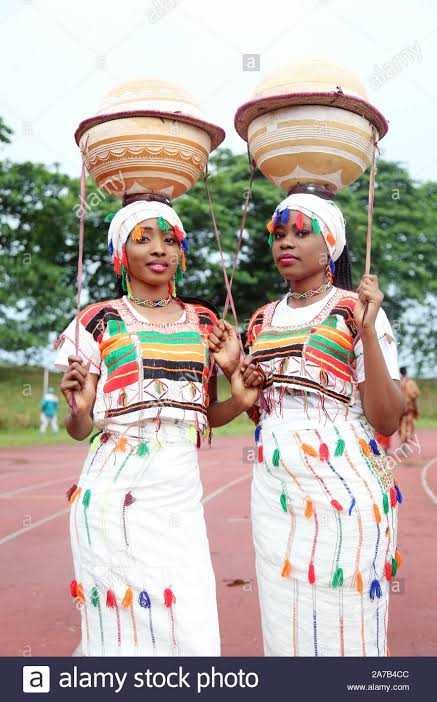
Sources
The Hausa and Fulani live in northern part of Nigeria. Nigeria consist of many tribes and cultures, Hausa Fulani are the largest or most populous tribe in Nigeria, even though the Hausa and Fulani are different tribes but they are considered as one tribe due to the close relationship that exists between the two tribes. Hausa In Hausa land there is one culture that is always practiced yearly by Hausa people known as Hawan Sallah.[2] Fulani The Fulani culture also take "Shadi" as their yearly celebration activities.
NIGERIAN LITERATURE
Nigeria is famous for its English language literature. Things Fall Apart, by Chinua Achebe, is an important book in African literature. With over eight million copies sold worldwide, it has been translated into 50 languages, making Achebe the most translated African writer of all time.
Nigeria has other notable writers of English language literature. These include;
Femi Osofisan who first published a novel Kolera Kolej was in 1975;
Ben Okri whose first work, The Famished Road was published in 1991;
Buchi Emecheta who wrote stories drawn from her personal experiences of gender inequity that promote viewing women through a single prism of the ability to marry and have children.
Helon Habila, Sefi Atta , Flora Nwapa, Iquo DianaAbasi Eke, Zaynab Alkali and Chimamanda Ngozi Adichie among others are notable Nigerian authors whose works are read widely within and outside the country.
NOLLYWOOD
Since the 1990s the Nigerian movie industry, sometimes called "Nollywood", has emerged as a fast-growing cultural force all over Africa. It is one of the largest film producers in the world, second only to India's Bollywood. Because of the movies, western influences such as music, casual dressing and methods of speaking are to be found all across Nigeria, even in the highly conservative north of the country.
SPORTS
Supporters of English football clubs like Manchester United, Arsenal, Manchester City, Liverpool and Chelsea often segregate beyond the traditional tribal and even religious divide to share their common cause in Premier League teams. The Nigerian national football team, nicknamed the "Super Eagles", is the national team of Nigeria, run by the Nigeria Football Federation (NFF). According to the FIFA World Rankings, Nigeria ranks 31st and holds the second-highest place among the African nations behind Senegal (20th). The highest position Nigeria ever reached on the ranking was 5th, in April 1994.
FOOD
Nigerian food offers a rich blend of traditionally African carbohydrates such as yam and cassava as well as the vegetable soups with which they are often served. Maize is another crop that is commonly grown in Nigeria. Praised by Nigerians for the strength it gives, garri is "the number one staple carbohydrate food item in Nigeria" a powdered cassava grain that can be readily eaten as a meal and is quite inexpensive. Yams are frequently fried either fried in oil or pounded to make a mashed potato-like yam pottage. Nigerian beans, quite different from green peas, are widely popular. Meat is also popular and Nigerian suya—a barbecue-like roasted meat—is a well-known delicacy. Bush meat, meat from wild game like antelope and giraffes, is also popular. Fermented palm products make a traditional liquor, palm wine, and also fermented cassava. Nigerian foods are spicy, mostly in the western and southern part of the country, even more so than in Indian cuisine. Some more examples of their traditional dishes are eba, pounded yam, iyan, fufu and soups like okra, ogbono and egusi.
MUSIC
The music of Nigeria includes many kinds of folk and popular music, some of which are known worldwide. Nigerian musicians have being nominated and won many international awards Grammy included.
Traditional musicians use a number of diverse instruments, such as Gongon drums. The kora and the kakaki are also important.
Other traditional cultural expressions are found in the various masquerades of Nigeria, such as the Eyo masquerades, the Ekpe and Ekpo Masquerades of the Efik/Ibibio/Annang/Igbo peoples of coastal southeastern Nigeria, and the Northern Edo Masquerades. The most popular Yoruba manifestations of this custom are the Gelede masquerades.
CLOTHING
Nigeria has over 250 ethnic groups and as a result, a wide variety of traditional clothing styles.
In the Yoruba tradition;
women wear an iro (wrapper), buba (loose shirt) and gele (head-wrap). The men wear buba (long shirt), sokoto (baggy trousers), agbada (flowing robe with wide sleeves) and fila (a hat).
In the Igbo tradition:
the men's cultural attire is Isiagu (a patterned shirt), which is worn with trousers and the traditional Igbo men's hat called Okpu Agwu.
The women wear a puffed sleeved blouse, two wrappers and a headwrap.
Hausa tradition:
Hausa men wear barbarigas or kaftans (long flowing gowns) with tall decorated hats.
The women wear wrappers and shirts and cover their heads with hijabs (veils).
Africa's largest economy is home to hundreds of languages and a rich movie industry. The manner in which they coexist together irrespective of their ethnicity and religion is something the should applaud world wide and am sure people all over the world are interested in these culture rich county. Who wouldn't? Naija to the world.
I really want to appreciate the of work @belenguerra and the #worldgeography for put up such a great contest and give an opportunity to share the culture of my people.
Thank you every for reading my post I hope to see you all in Nigeria one day. Visit and you won't want to leave. This is my first official post any suggestions/correction is appreciated in the comments box.
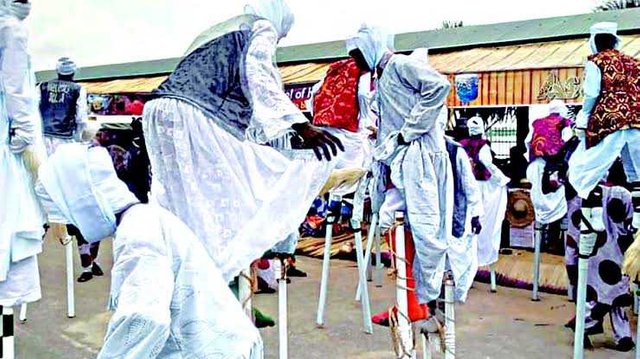
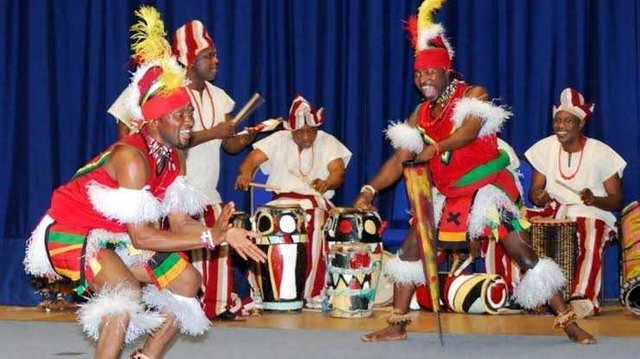
Thanks a lot for joining my friend!! Yoruba culture seems to be extremely interesting!! Great post!!
Greetings from Argentina!!
Thank you. Nigerian is a country rich in Culture. See you here one day